We’ve updated this very popular article, originally published in late 2020, because it just turned into a whole book! Welcoming Your Puppy from Planet Dog is now available wherever you buy your books.
A secret thought—unutterable even to family members—keeps more than a few new-puppy owners up at night: “What if this was a mistake?” New owners tell me, sometimes in a whisper, that they must be missing something. Getting a puppy was supposed to be fun, but all they feel is stress. Frustration. Even anger.
They seek me out for the Magic Answers, the training tips that will bring peace. They are at their wit’s end with the biting, the peeing, and the destruction. They get out their notebooks, ready to record expert information, personalized for their situation.
I absolutely do have those tips and tricks, strategies and game plans. Here’s the problem: They’re not going to work without the right mindset. There is actually just one thing I want new owners to write down in that notebook, so they can make it a part of every interaction they have with their puppy:
“This is a baby that I kidnapped from another planet…”
The way to enjoy puppyhood—and emerge from it with a beautifully trained dog—is to get in the right headspace. A real, live puppy won’t fit neatly into your regular life, and trying to make it so is a recipe for constant angst. The happiest puppy people are the ones who dive into this phase and back-burner their other things.
Need a convincing reason to do that, because it feels wrong to prioritize a little ball of fluff? Try this:
Just a baby!
Kidnapped!
From another planet!
Far away from its own tribe, its own customs.
Lead with the empathy that idea demands, and you’ll find your groove. When you adjust your expectations for this little puppy to where they should be, suddenly training is simple. Not easy, but simple.
A FRUSTRATED MINDSET BLOCKS PROBLEM-SOLVING
The “poor baby” bit may sound ridiculous to you if you have a new puppy now napping, rather indulgently, in your lap. After all, this pup is lucky to have landed with you. Not only is there plenty of food, but there is an expensive dog bed and an overflowing toy basket. More importantly, you have turned your whole dang life upside-down for this dog. It seems like all you do is deal with the puppy!
All true.
But the more relevant truth is this: Before you took him home, that 8-week-old puppy spent every single moment of his little life in a cozy, warm scrum with his own kind. He was cheerily hanging out with his family doing everything that comes naturally to dogs: wrestling, biting, sniffing, chewing, and jumping. He was never alone. He had no idea you were going to swoop in, kidnap him, take him to a new planet and, here’s the kicker, suddenly be mad at him for everything that is prized in his culture.
Let that sink in.
Take your time.
Aw, shucks. Now you feel sad. And you want to know what good it does to ponder this depressing thought. After all, this is how it has to go—it’s not like the puppies can live on Planet Dog together forever.
But forcing yourself to sit with this concept increases your empathy for the puppy in front of you. If your mind is focused on your own disappointments (pee on the carpet again! more chewed shoes!), it leads to negative interactions with your puppy that can only hinder progress.
If, instead, your mind is filled to the brim with what your poor puppy must be feeling (confused, lonely), your own anger should evaporate. And that makes room for effective problem-solving.
In my experience, the Magic Answer to all of puppyhood is empathy. Not some fancy dog-trainer technique. Plain old empathy. I promise it’ll make you happier throughout puppyhood, and help you become a dramatically better teacher for your puppy as you learn to work with your puppy’s native ways.
EVERYONE BITES ON PLANET DOG
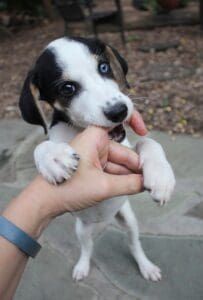
On Planet Dog, everyone in polite society explores new things by mouth. Given the absence of hands, it’s the most effective, most satisfying way to engage. Puppies, in particular, use their mouths to play with their friends and to learn about the world.
People who don’t give any weight to their puppy’s background culture are alarmed by this mouthiness. They feel they may have picked “the wrong one.” The kids cry, saying, “I don’t like her! She’s biting me!” The parents put the put the pup in the crate for another hour, thinking “That’ll teach her.”
It doesn’t need to be this way. Owners who operate out of Planet Dog empathy will wake up in the morning to a bitey pup and their first thought will be, “Oh! You are missing playing with your friends the way you used to! You’re trying to play with us that way!” The thinking cap goes on and the mind is open. As your pup’s only guide to Planet Human, how can you help this dear toddler who’s trying her best in a challenging transition? Suddenly the answers are obvious:
* Bite-wrestle playdates with other puppies or gentle adult dogs. This is not a luxury, but instead an everyday need for all from Planet Dog. Once puppies have a happy outlet for that mouthy socialization, they are beautifully able to begin to learn our human ways.
* Long, flat, fluffy toys that allow pup to safely play a familiar-feeling bitey game (tug of war) with her human friends.
* The gentle teaching of new games that do not involve mouthiness: fetch, sit-spin-touch for treats, “find it,” etc.
People often tell me their puppy “just doesn’t understand the word no,” particularly regarding mouthiness. My answer is that when you set up your puppy’s day to match her needs, you’ll barely need to say no. Saying “no” a lot means you may have forgotten that you—say it with me—“Kidnapped! A baby! From another planet!” Having taken that dramatic action, it’s only right to do everything you can to help her adjust.
THERE IS NO ALONE-NESS ON PLANET DOG
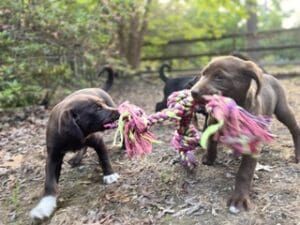
On Planet Dog, puppies are virtually never alone. From the moment they’re born, they’re surrounded by littermates and within a leap or two of their mom. That makes for constant companionship, exercise, and warmth.
Once brought to Planet Human, a puppy might spend the vast majority of his time alone in a cold crate in an empty kitchen. When this toddler naturally cries out for companionship, he may be yelled at by the human who is his sole connection in this new life. “He needs to learn. He already had a walk around the block, plus I just played with him for a while. Now I’m busy.”
Leading with empathy makes it obvious that, while of course eventually this baby needs to learn to hang out alone, shock treatment is not the most effective learning experience. Furthermore, it can easily have the unintended consequence of making it even scarier to be alone. Once inside your puppy’s head, you’ll gravitate toward a stair-step approach to help your pup learn to be confidently alone. You’ll think about combining:
* A wonderfully tiring morning doggy playdate.
* A little brain-stimulating training.
* Moving your laptop into the kitchen for a while; then to the spot right outside the kitchen gate but in puppy’s sight.
* Providing delicious stuffed Kongs whenever pup’s alone
As our little alien gets used to life with humans over the first weeks—aided by Planet Dog-oriented approaches like these—pretty soon puppy is happily enjoying his own company for reasonable stretches of the day that can get longer every week.
THERE ARE NO LEASHES ON PLANET DOG
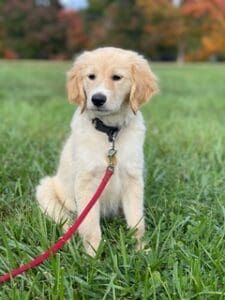
Imagine a recently kidnapped puppy’s terror when a strange thing is placed on her body and suddenly she is pulled around by it. Even worse, she is dragged outside into a world she’s never seen before, with loud noises and other creatures that are utterly foreign. Her struggles to escape only make matters worse—the noose tightens!
So many new owners are mystified when this pup is reluctant to accompany them. They just pull her along thinking, “She’s so weird! All dogs like walks. I’m sure she’ll get used to it.” And generally, she does—but only after experiencing a lot of fear and losing trust in her human.
In contrast, owners who remember the key information— “Just a baby!”—will consider how terrifying this could be, which opens up the mind to all sorts of ideas. “Hmm … How could I make this leash walk less frightening to a baby?”
* Maybe spending the first afternoon with just a light little collar and progressing to an attached light kitty leash the pup can drag around.
* Perhaps by the end of the day you’re picking up the end of the leash from time to time, throwing treats ahead of the pup so her focus is forward, on that.
* Later, you’re happily doing all of that out in the backyard, with the pup getting used to tension on the neck every now and then while you’re feeding a tiny bite of hot dog.
* Maybe you’re also sitting together out front and watching the world go by, sharing a bit of cheese when loud trucks or new folks pass, just to form some happy associations.
Within days, this pup raised in empathy is happily walking on leash up and down the street with her trusted owner, who feels all the closer to her pup for the mini-journey they’ve just taken. (It’s likely that the other owner, who was in a rush to get these walks going, still will be wrestling with a skittish walker weeks later.)
ON PLANET DOG, YOU CAN PEE ANYWHERE
The #1 issue creating the tossing and turning of the new-pup owners I counsel is the challenge of housetraining. Even the most committed seem to buckle at the three-week mark and confess to yelling.
Alas, our little kidnapped baby just learned, from that angry shout, that her person is scary. Unpredictable. Not to be trusted. Training will now go more slowly. Maybe she will always hold back just a bit because of the intimidating yelling from “her person” at this sensitive age. Who knows what lesson she learned from that punishment? Options include:
* I’d better hide from humans if I need to pee! Maybe behind the couch.
* I don’t want to pee in front of a human, so I won’t pee on leash anymore.
* Right before my person yelled I was looking at the small child, so that must be a bad thing on this planet. I will run from small children now!
Our human housebreaking rules make very little sense to the folks from Planet Dog. While it is obvious to you that the dining room carpet is no place to relieve yourself, to your puppy it seems ideal: it’s away from the prime living space, and it’s got nice absorption, plus traction! Start with empathy, understand that your pup has drastically different instincts than you, and set him up for success:
* Do not give him the freedom that will lead to “accidents.” (They’re hardly accidents when the individual doing them has no idea they’re doing something wrong!)
* Keep eyes on that puppy 100% of the time he’s not in his crate. “Eyes on” does not mean “in room with laptop open.” Learn his signals (abruptly walking to a corner? sniffing the ground?) and respond immediately.
* A human needs to get that pup outside, and walking around, once every half hour to start! Only with success can that stretch to 45 minutes, then an hour ….
No shortcuts. I’d sugar-coat it for you but that doesn’t do you any good in the long run, so here it is: After a week or two, every “accident” is your fault. I’m so sorry.
“Hey!” You may be saying. “Where’s the empathy for the human?!?” I know. It’s just that you’ll get that elsewhere, when you talk to other humans who can’t believe you actually got a puppy. I’m here to speak for the puppy, who did not choose to be kidnapped by aliens who thought they could carry on their regular day-to-day afterward.
THE DREAM IS IN REACH
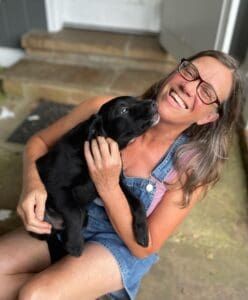
Frustrated new puppy owners think they’re not asking much. “Sheesh, I just want to hang out with him and cuddle.” But that’s not actually true. We also ask them not to bark, jump, bite, pee, sniff, or chew. Sometimes, it’s as if we’re asking them not to be dogs.
It is frankly amazing to me how well puppies do during this overwhelming period of transition, from one planet to another. They are beautifully adaptable – so adaptable that even when shoe-horned immediately into a human’s world of doggy “no’s” they often do okay.
But in the homes where Planet Dog empathy rules from Day One? Those are the homes where the whole puppyhood thing looks just like it does in the storybooks. Sure, some real-life things had to be put on the back burner for six months. But there was no tossing and turning, and there were no secret thoughts of regret. These are the folks who wonder what they did before they got this new friend. They are also, by the way, the people whose dog is walking at a relaxed pace with a loose lead, gazing up at them, wondering what happy thing might be next.


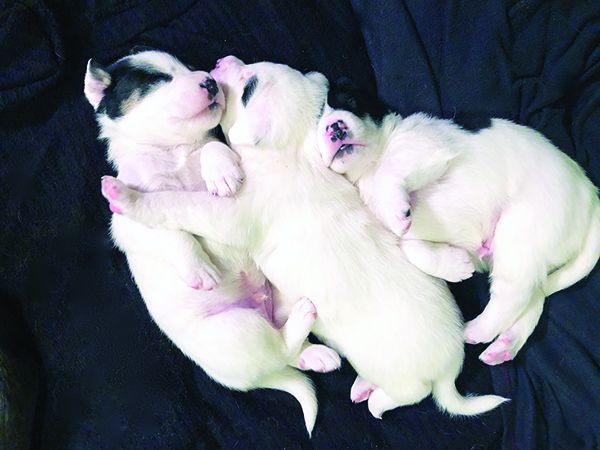
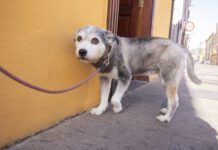



They look so cute! *sending my huge love to them*
This article is so cute too!
One of the best articles talking about raising a puppy that I’ve ever read! Thank you! Its perfect!
This article Is so good I feel it deserves a broader audience, so I have shared it via a link on Reddit r/puppy101
Bery nice to have people like them to give us the information.. thank you.
We are kidnapping a new puppy Friday for my 14 year old Mini Ozzy. Lord help us. She said she is going to take care of it as it will be her dog. We will have to wait and see.
It’s been 3 months now with your new puppy.. how’s it going? Is your 14 year old doing ok– who is doing the training, you, the Aussie or the puppy? Hoping things are peaceful on your planet 🙂
Sara Glasser, and the wild bunch – 3 Rhodesian Ridgebacks, one is 10, one is 8 and the other one is just 2 years old – oh my, I have every ONE of the issues described in the article but we are perservering and I just cannot imagine life without that puppy. 🙂
This article reminds me of why I love Whole Dog Journal. Each issue has articles by compassionate writers who understand and care about dogs. Thankyou, WDJ
This is so helpful! I’m picking up my eight week old puppy next week with equal parts excitement and terror. The words empathy and kidnapping are helpful as my world will move sideways. I look forward to following educational articles going forward.
Wish I’d have read this before I adopted my pup! VERY good article! Thank you!
Absolutely one of the best articles about raising a puppy I’ve ever seen. What a great way to communicate to new owners. Definitely sharing with clients. Thank you, Kathy
Love this. my dog says ” thanks”. you are a compassionate and understanding pet guardian
I love this article. I have been specializing in training pandemic puppies as a dog trainer and I often refer to the puppies as little aliens, so I particularly enjoyed reading this.
I forgot to mention that I remind puppy parents that their little alien doesn’t understand the same language as them.
Love, Love, Love this article!! Thank you!
This is hands down one of the best articles I have ever read about puppyhood!
Empathy.
So true.
We’ve had Riley for almost a month now, he is almost four months old, and I see light at the end of the tunnel.
I do have a question regarding house training. If we do not yell at them for “accidents”, how do they know it is wrong to go in the house? I take Riley out every hour and he knows “go potty” when we are outside, but he doesn’t know he isn’t supposed to go inside yet.
The key — and this is hard! — is that you don’t give him the chance to make those mistakes. If there are accidents, then you want to restrict his space more and get him outside even more often. Restricting space is key, because pups don’t want to pee where they “live.” Getting him outside so often he doesnt’ have a chance to have to pee inside is key. Pretty soon he automatically thinks “pee!” when he’s outside because all those smells are out there … and very importantly, NOT inside. Every indoor pee increases the probability of another indoor pee! It’s exhausting, but for these weeks somebody has to be 100% on duty an whisking pup outside. Don’t worry, this will all be over soon as long as you commit now!
Not sure why, but I cried through reading this whole article??? New daddy to a cute little “alien” along with my husband. Really loved reading this and will share. So good to know. And that’s coming from someone who has had dogs all his life!
After 3 weeks I can say that my 12 week old setter pup is settling in quite well. She is not mouthy or destructive, sleeps through the night in her crate beside my beed without fussing, is learning commands quickly and housebreaking is going well with maybe one accident a week. The only issue we have is alone training.
I work from home so opportunities for the puppy to learn to be alone are limited. Coupled with being a single dog owner, I can’t rely on friends or sitters to watch her anytime I need to run to the grocery store or to an appointment. I’ve been working hard on making the crate a positive place, she’ll run into it with gusto on the “kennel” command, will happily chill out in it and nap with the door closed while I work nearby, and we play various crate games to continue to build positive experiences with it. When I do leave the house or if I need some time away from her to teach her to be alone she does often cry and bark and dig at the crate despite having been aired out prior to going in and exercised physically/mentally, having relaxing music playing, covering the crate, and given a bully stick (frozen stuffed kongs held no interest for her). She is never let out while actively crying or barking. I’m not sure what else I can do besides just stick it out? Normally I crate her downstairs in my bedroom in the basement which is also where she sleeps at night but because we don’t really hang out in there or do many training or other activities there I’ve been contemplating leaving her crate in the family room while I’m out with the same techniques with the hope that maybe the positive associations with that room will help.
The kicker is she’s usually pretty good to lay on a dog bed and nap while I do things around the house or even nap underfoot while I work at my desk. And really she is a pretty awesome puppy by all standards. I am just anxious myself about separation anxiety
I like dogs
me too
so do I
I agree
This is the most brilliant piece I’ve ever read. A copy is going home with every puppy I place now – THANK YOU!!!
Fantastic way of describing what it’s like in a dogs world 🐶❤️
What a WONDERFUL article! It should be required reading for every new puppy “parent.” Thank you for this unique spin on puppy adoption.
Finally, an article about empathy! As a former humane educator for spcaLA and a former elementary school teacher, I truly believe empathy is the key to everything. I have not read an article like this and I’m so thankful you wrote it. Applause!
Excellent article, great mind-set for any dog. This approach applies to rescues as well. Thank you for sharing.
As someone who has a soon to be 1 year old Doberman Pinscher, I wish I had read this article when I brought him home back in September. I also said to myself anyone and everyone who turns a puppy over to someone else’s hands should require the new owner to read this article before leaving with the little guy or gal. Excellent article!!!!!!!!!!!!
Excellent article! Thank you!
I was a teacher so any time I got a new puppy I had to wait until end of June so I’d have the summer to be home with it and we could grow up together and gradually get used to my absences, which started brief but graduatlly extended. By the time I went back to work, the puppy loved the yard and had plenty to keep it occupied while I was away.
Now I’m retired and it doesn’t matter what time of year I get a new puppy. I got Diana Christmas 2018 and adopted Freyja (who was already a year old) in June. I treated Freyja the same way I treated a new puppy. I spent a lot of time with her, then once she was comfortable with the house and yard I left for brief amounts of time leaving her with Diana. Then I gradually extended that time. The only change is I never leave her alone. I can take her with me and leave Diana alone but I can’t never leave Freyja alone. You just learn to adjust to their individuality.
The only thing that will change now is by the time I get another new puppy it will have to be a smaller breed dog rather than the big dogs I’ve always had.